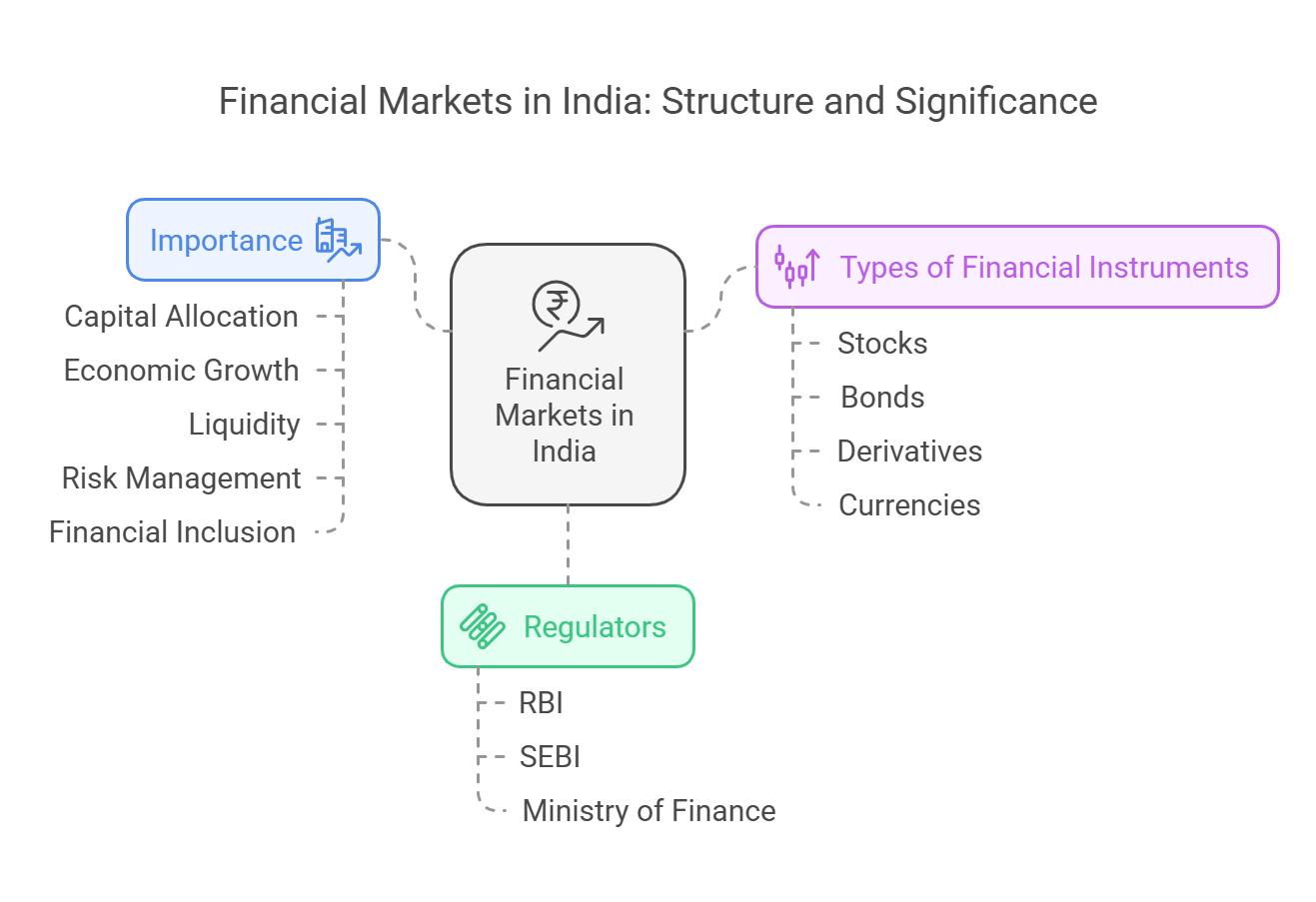Introduction to Financial Markets in India: Role and Importance of Financial Markets
Financial markets are places (physical or virtual) where buyers and sellers trade financial instruments. These instruments include:
- Stocks: Represent ownership in a company.
- Bonds: Represent loans made to a company or government.
- Derivatives: Contracts whose value is based on an underlying asset.
- Currencies: Used for international trade.
In India, the Reserve Bank of India (RBI) and the Securities and Exchange Board of India (SEBI) are the main regulators of financial markets. The Ministry of Finance also plays a role.
Why are Financial Markets Important?
Financial markets are the backbone of a healthy economy. Here's why:
- Capital Allocation: They direct money to its best uses, funding businesses and projects that drive economic growth. Think of it like a plumbing system for money, ensuring it goes where it's needed most.
- Economic Growth: By connecting savings with investment opportunities, they encourage economic activity, creating jobs and wealth.
- Liquidity: They make it easy to buy and sell financial assets, meaning investors can access their money when needed.
- Risk Management: They offer tools (like derivatives) to protect against financial risks, such as changes in interest rates or currency values.
- Investment and Savings: They provide a place for individuals and institutions to invest their money and grow their wealth.
- Financial Inclusion: They can expand access to financial services for more people, including those in rural areas.
- Monetary Policy: They help the RBI control the money supply and interest rates, which are important for managing inflation.
- Corporate Governance: They promote transparency and accountability in companies, protecting investors.
- Government Funding: They allow the government to raise money for important projects through the sale of bonds.
- Lower Borrowing Costs: They can lower the cost of borrowing for businesses and governments, making it easier to invest and grow.
- Foreign Investment: They attract foreign investment, which strengthens the Indian economy.
- Price Discovery: They help determine the true value of financial assets based on supply and demand.
Types of Financial Markets in India:
-
Money Market:
- Deals with short-term borrowing and lending (less than a year).
- Examples: Treasury Bills, Commercial Paper.
- Purpose: Helps manage short-term cash needs.
-
Capital Market:
- Deals with long-term securities (stocks and bonds).
- Divided into:
- Primary Market: Where new securities are issued (IPOs).
- Secondary Market: Where existing securities are traded (BSE, NSE).
-
Foreign Exchange Market (Forex):
- Deals with the exchange of currencies.
- Purpose: Facilitates international trade and investment.
-
Derivatives Market:
- Deals with financial instruments whose value is based on underlying assets.
- Examples: Futures, Options.
- Purpose: Hedging and speculation.
-
Commodity Market:
- Deals with the trading of raw materials (agriculture, metals, energy).
Why are Financial Markets Important for the Indian Economy?
- Economic Growth: They encourage savings and investment, leading to economic development.
- Investment Opportunities: They offer a variety of investment options for individuals and institutions.
- Liquidity: They make it easy to buy and sell assets.
- Global Integration: They connect the Indian economy to global markets.
- Stronger Companies: They help companies grow by providing access to capital.
Conclusion:
Financial markets are essential for the Indian economy. They efficiently allocate capital, promote economic growth, and provide a platform for investment and risk management. Their continued development is crucial for India's economic future.


No Comments